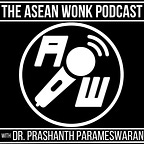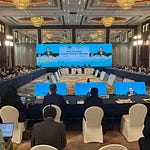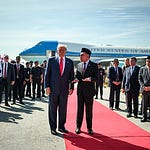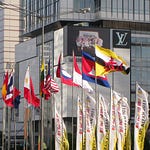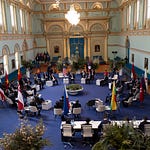[Note: This is the free preview within the dedicated podcast section of the ASEAN Wonk website, with the full version in a post published on September 18, 2025 available to our paying subscribers. This is not meant to serve as new content and is part of our free preview content within the dedicated website podcast section].
INTRODUCTION
ASEAN Wonk: Welcome to the ASEAN Wonk Podcast where we bring you expert insights and regional perspectives on Southeast Asia and Indo-Pacific geopolitics and geoeconomics. I'm your host, Dr. Prashanth Parameswaran. And if you haven't already, do make sure you're subscribed to the ASEAN Wonk platform at www.aseanwonk.com so you don't miss any of our full posts.
Our guest today is Brigadier General David Stilwell, who served as assistant secretary of state for the bureau of East Asian and Pacific Affairs under the first Trump administration after a series of other roles as well, including as defense attaché to China and as part of the US Air Force where he started his career back in 1980. We'll start our conversation talking through a number of contemporary developments, including the Trump administration's approach to Southeast Asia and country perspectives on not being forced to choose between China and the United States. Be sure to stay tuned as we go through a range of other subjects, including the future trajectory of US China relations and Washington's approach to flashpoints such as Taiwan and the South China Sea.
Note: The transcript that follows the above free clip preview has been lightly edited for clarity and organized into sections for ease of quick browsing. For all ASEAN Wonk Podcast episodes, full video and audio podcasts, along with edited and sectioned transcripts as well as block quotes, will be a premium product for our paying subscribers, but we will include a short free transcript preview and a clip for all readers to maintain accessibility. Paying subscribers can find the rest of the full transcript and the full video podcast right below the paywall. If you have not already, do consider subscribing, and, if you have already done so and like what you see and hear, do consider forwarding this to others as well who may be interested. Thank you for your support as always!
TRUMP II VS TRUMP I POLICY CONTEXTS
ASEAN Wonk: So welcome to the podcast, General Stilwell. I wanted to start, given your experience serving in the first Trump administration, with where you see continuities and changes in Trump I vs. Trump II. Talking to policymakers in the region, there's a sense that in the second Trump administration we're seeing the obvious headline makers like the hardening of tariff policy, some continuity on issues like scam centers, for example, and there's also a category of maybe a little bit too early to say definitively on where we're heading on issues like China policy as we build up to leader-to-leader interactions there. You travel extensively in the region and we've actually been in a few engagements as well over the past year in Southeast Asia. What's your sense of how things are looking on the Asia policy front in Washington, as well as the regional perceptions and responses to that?
General Stilwell: Well, thanks for having me here. And, hopefully, my perspective adds to the conversation and doesn't detract too much. But the focus has been on great powers, big economies like China, and then from there, Northeast Asia, primarily Japan. We can talk about that later, the over under on that. So Southeast Asia, in general, I think has gotten a pretty good treatment on this. The agreement with Vietnam came across fairly quietly without a lot of drama, which says there's interest in shifting markets and development and production centers away from one main aggressive and adversarial center and shifting it to countries that have lower labor costs and have many other advantages that that the PRC has since lost. So I can't speak to all, but I do know that I was fairly happy with how the agreement with Vietnam came out, and we're going to focus primarily on economic sense.
Unlike Trump I, where the action areas were the Defense Department and the State Department, it really seems like there's been a shift away from that more toward Commerce, Treasury and USTR. No criticism there. If you're looking at national debt now at $37.5 trillion dollars, you’ve got to do something to get that under control. And if you do that by pumping up the economy, moving industry back to the US, all the things that we're hearing about, that's a reasonable approach. I would just say it can't come at the cost of those other traditional security centers like Defense and State.
“Unlike Trump I, where the action areas were the Defense Department and the State Department, it really seems like there's been a shift away from that more toward Commerce, Treasury and USTR.”
PLURALISM AND COMPETITION IN US SOUTHEAST ASIA POLICY
ASEAN Wonk: The other aspect I wanted to zoom in a bit on is what we've been hearing since actually a few years ago publicly from Southeast Asian officials about not being forced to choose between the United States and China. My own sense has long been that this is more about the choices that these countries actually make for themselves and how they make them, rather than anything that's imposed by Washington or other countries. And sometimes, as we both know, choices are being made more for shorter-term regime interests, which are not necessarily the same as longer term national interests. You’ve spent a lot of time thinking through the issue of choices. I recall when you were Assistant Secretary, you tried to emphasize the fact that under the first Trump administration, just because there was a greater focus on sovereignty didn't mean that there wasn't room for pluralism and notions of multipolarity.
At the same time, you fast forward a few years to the present, you know, just a few weeks ago we saw China with its Shanghai Cooperation Organization summitry in Tianjin promote more aggressively its own notion of what a world order should look like, and the Global Governance Initiative was rolled out. How much room do you think there is for this kind of pluralism and coexistence of worldviews as these views are competing increasingly between the United States and China and other capitals are adjusting their own approaches to this as well?
General Stilwell: I actually I love the idea of pluralism. We took some heat over that presentation at Brookings when we gave it in 2019. The mighty David Feith wrote that speech. He wrote it at the last minute because he just had this change of heart. And the folks at Brookings were surprised that we went down that path, but think about it. That was my experience everywhere I went is people were very happy when American diplomats did not show up with a non-pluralistic agenda saying, my way or the highway, you're going to do human rights, you're going to do all these things that we demand of you.
I grew up as a fighter pilot, and we're a fairly direct bunch. We don't use a lot of diplomatic language. And one of the first things you learn is you've got two ears and one mouth, and you should use them in those proportions. Well, I suggest our diplomats consider that because I oftentimes would follow one of my colleagues into a capital, and they had just gotten wire brushed and the finger wagged in their face about doing things that were culturally the norm for them. So, one, we have to stop preaching at folks. We need to listen to what they have to say. If we want to guide them; if we want to see change in how things are going, if there's human rights practice, we gently guide them into that without trying to force them. And so it starts off with diplomacy. And we should be teaching these things as we raise our diplomats. On that point, though, the Chinese version of this stuff is unipolar. It's unilateral. It's my way or the highway. You will do these things. And then they go after these countries at the SCO summit. I mean, it's rogue’s gallery. It's countries that really have no accountability with their own populations.
And my first experience with this was at that Shangri-La Dialogue in 2014. I went with the chairman of the joint chiefs of staff Marty Dempsey, and Chuck Hagel, a Republican congressman who the Obama administration brought in as secretary of defense. What a great choice. The Japanese made a very strong press for watching out what the PRC is doing with debt traps and all that stuff. It was the first time that there was actually a really strong contentious back and forth between the PRC and, in this case, the US. All the others were hanging back behind the US going: okay, you guys take this one, but we don't want to get splashed. Don't make us choose between the two of you. That's why this headline really got my attention: we want a strong economic relationship with the PRC, but we want the US to provide our security. Now think about the math on that. When you're doing trade – economic interactions and those things – it should be a win-win. Everybody's condition increases. Security is not that way. Security is a bill. It's costly. We're going to spend $850 billion this year on the Defense Department, and that's not even enough. So I've been wrestling with that since 2014. I hadn't come up with a good four syllable response to “don't make us choose.” A very good friend and a former colleague and a former boss came back with “Lee Kuan Yew chose.” I like that one, but maybe a little more something a little less.
“I hadn't come up with a good four syllable response to “don't make us choose.” A very good friend and a former colleague and a former boss came back with “Lee Kuan Yew chose.” I like that one, but maybe a little more something a little less.”
Look at Pakistan. Pakistan went all in with the PRC with this China Pakistan Economic Corridor, and now they're regretting it. And they want to get out of this bad deal. Well, if I was in charge, I would say, I'm not going to make you choose. You decide which way you want to go, but it's a one-way door. Because if you're going to trade on American interests and American taxpayer dollars and use that to sweeten the deal with the PRC, well, don't come running back to us when that deal goes south as the China Pakistan Economic Corridor is. And the last thing on that, we want to talk about finance, it's obscene that Islamabad has gotten so badly in debt. Provides them no benefit. This thing is about moving energy from Gwadar into Kashgar in western China, and the Pakistani government gains very little or anything from that. But yet they're stuck with the bill. And in order to keep them from defaulting, they're going to the IMF. The IMF has taken American large part contributions, and they're not going to Islamabad. Where's that money going? It's going to Beijing. So they're actually validating this debt trap diplomacy, and we're a part of it. I don't want to be involved in that in any way. Pakistan, you made your deal with the devil. You're going to go live with it. You figure out how to get out of this default. That would be a good choice. Default. And then from there, we can work with you. But don't take good money from World Bank and IMF and send it up to Beijing for your bad decision.
REFRAMING CHOICES AND TRADEOFFS
ASEAN Wonk: Just to quickly follow up on that, in terms of the choices that these countries make or want to make, is there a sense in your view that there are certain areas where those choices are more important. Telecommunications is a very different space from retail. Where you choose to get your submarines from, for example, that's a very different capability from buying rifles, because one is much stickier and there are big concerns about interoperability, the other one not as much. So I'm wondering, in your experience, is there a way to think about these choices in ways that are much more granular in terms of what these countries are facing?
General Stilwell: In an ideal world, we would all go back and read about the Cold War and note that early on, we did try our best to make a deal with the Soviet devil. And, eventually, what was the answer to that? It was called containment. And so we had the Soviet bloc, and you had the free world. And look. As much as we hate to go back to this, as much as people don't want to think about Cold War and nuclear annihilation and worse – we just went through a pandemic – this is clearly part of the calculus. It's an ugly truth that we're all going to have to sit down and eventually come up with a plan to decouple and get out of this mess.
Now you have a great question about, you know, you buy submarines or you buy submarine cables. Is one better than the other? Let me offer a contrast. We intervened in several submarine cable purchases or contracts with Huawei before they made a decision using a number of instruments. One called the Transaction Assistance Fund, which doesn't get as much play as it should. It was a ten-million-dollar budget point, and it used the thing that America has the most of our surplus: we're burgeoning in one thing, and that's lawyers. And so we took this surplus of lawyers with One Belt, One Road. Well, how about we ship it overseas and help Burma make a decision on whether this Kyaukpyu Port is legal, if it's sustainable, all those things. And we helped them negotiate down a big bill for this port and energy facility down to something that was a lot more reasonable. So if we can turn them into something that looks more like a reasonable nondebt trap arrangement, well, send our lawyers there. I think it is still active. I think we should use it a lot more.
But submarine cables and other things, these strategic concepts are in a world where it's not about nuclear or kinetic warfare: we are in the world of economic information warfare. I plan to talk a lot about that here. And outsourcing your submarine cable development to Huawei and others might not be your best choice. On the other hand, the prospect of a Vietnamese Kilo submarine engaging with a Chinese gray hull combatant – possibly winning that exchange – I love that idea. Vietnam has its own sovereignty issues. It has its own long geographical frictions with the PRC – nine dash line, eleven dash line – and it has come to a head. In 1988, there's a video of PLA Navy folks machine gunning much of Vietnamese sailors standing knee deep in water in parasails.
So definitely there's a lot of friction there. If they happen to use Russian stuff, which is pretty good to defend themselves, I love the idea of Beijing staring at Moscow and going: did you really have to sell these guys your subs? India's bought that stuff and others. So let's use a little bit of judo here. Remember, judo is using your adversary's effort and energy against them. We're no longer a Nebraska lineman. We're not three hundred pounds, and we can't put the adversary on their butt anymore. We can't just bulldoze people. We're going to have to use our heads and use concepts like judo where we see the PRC digging a hole, making a mistake. As Napoleon said, never interrupt your adversary in the middle of a mistake. And then maybe even amplify that mistake for them. Let's be a little bit more nuanced in our thinking.
“[T]he prospect of a Vietnamese Kilo submarine engaging with a Chinese gray hull combatant – possibly winning that exchange – I love that idea… If they happen to use Russian stuff, which is pretty good to defend themselves, I love the idea of Beijing staring at Moscow and going: did you really have to sell these guys your subs?”
GEOECONOMIC ENGAGEMENT
ASEAN Wonk: The example of the Kyaukpyu port in Myanmar is interesting because the bright and shiny new infrastructure projects get the headlines but there are things behind which don’t like technical assistance and capacity-building – the soft components of infrastructure rather than hard components. As you said, that was important for Myanmar at that time to be able to make sure that they weren't making a decision that they would later end up regretting. One other aspect that goes missed is U.S. private sector investment. Interested in your views on that given your past experience with both the defense space and the State Department given the focus now on other economic components such as foreign aid and infrastructure.
General Stilwell: A giant topic. Let me start off with how this comes to be. Rudimentary, not fully developed governance; countries with governments that are still more on the authoritarian side – it's really hard to hold your leaders to account. So your hard and soft infrastructure: they make decisions not based on overall betterment of their own people and national interest; they make them based on elite capture and money. I mean, you look at Solomon Islands, Sogavare and the rest of that stuff. And you see it in Southeast Asia as well.
Key to that is transparency. So one thing we can do: we got a lot of reporters – we can help them expose and show and hold accountable their leaders. Not to the point, like – unfortunately, USAID had gotten a reputation for doing as far as funding revolutionary groups because they weren't pro-LGBT or, you know, supporting x or take your pick. Instead of focusing on the basis of what aid was – putting food on the table and helping people thrive – aid did drift into more sensitive subjects: back to pluralism. We have to accept that these countries are moving at their own pace, and they won't go faster just because we're pumping money in there. And, again, the governments look at aid money and many times don't want it because it brings with it all these strings. So it's unfortunate there are some programs that were beneficial that are going to suffer. I think in two or three years when we then take stock and look at the ones that were doing good things – PEPFAR and others, vaccines, food – we can sift the wheat from the chaff on that.
So other things worth talking about are those deals made in places like Naypyidaw and that Myitsone dam deal. Now I don't know how Beijing got the initial approvals going or started building that dam, but when the government of Myanmar saw what this thing was turning into, they rightfully shut it down. And good on them for having the courage of doing that. To paraphrase from Star Wars. “It's not the deal I signed up for.” And from Beijing: “I'm changing the deal. Pray I don't change it more.”
So infrastructure in itself is an unvarnished good. It is helping people move things and people around. That's a good thing. But when it comes to these extra strings or the quality without transparency, it's shoddy. And now we've got governments holding the bill for stuff that's not helping them. I mean, there was a runway built on Timor Leste that within maybe a year began to crack and crumble. It is of zero use, and yet they are going to have to pay for that. So as far as private sector goes, let's look at the bad examples. Let's talk about Goldman Sachs and the 1MDB deal in Malaysia. You know, Goldman Sachs was every bit a part of that. So we've got to police our own. Make sure that these deals aren't looking more like a Chinese deal, and looking more like what you'd expect coming out of the US.
But in my travels, a couple things came to light. I got to all but two of the ASEAN countries. I spent more than half of my time in ASEAN. And to me, it is the fulcrum. It is the point that we need to focus on in the Indo-Pacific that is going to be, one, be highest bank of buck and get the most out of investment in this relationship, and also needs our attention because of the disparate nature of the ten member states. Things we can do to maybe help them help themselves. I'll talk about those in a bit. So we saw 1MDB – that was just bad. But then you look at HP when I was in Singapore: HP trains native managers, local managers, unlike the PRC, which you're seeing in Pakistan right now. They bring in all their own labor. Booze swilling, pork-eating atheist Chinese in a Islamic country? It doesn't go well. That's why Islamabad fronted fifteen thousand troops to kill Pakistanis in Balochistan who are not happy with the Chinese operating in there. So, strange bedfellows with these Chinese deals. Again, it's not our job to fix it. What we do, what American companies do, is they want better insurance. They want to improve a lot, not because of some altruistic need: they want to do it because you train these people, they'll actually do much better job for you. This is a basic American concept. Vietnam – Starbucks offers its employees a free four-year college degree. Online, virtual, fine, but it's a lot better than deals they're getting from other places.
So last point on this is as we traveled around, a criticism is we are extremely uncomfortable advocating for American companies and American solutions in these capitals. And so the chambers of commerce and American companies near the embassy, when we meet with them, they were frustrated because the PRC would roll in with bribes and cash and stuff, and we would lose these deals over and over again. Whereas if we had just a little bit more support from the foreign commercial services and others at the US embassies, our people up front, we would get our best diplomats in front of our partners, and those diplomats are our businesses. It's our businesspeople. It's gone wrong in the past – United Fruit Company in Central America, I get it. But from my experience in the region, American business put the best face of America forward in their every order. And, you know – twenty-five thousand in the State Department, Foreign Service Officers – a lot more business people out there in the world than that.
RECOMMENDATIONS ON TAIWAN CONTINGENCY PREPAREDNESS
ASEAN Wonk: You brought up some good points there. There’s often a focus on strings coming in with U.S. assistance, but actually there are actually irrespective of the source: the strings are just different and the elites and regimes may interpret those strings differently, whether it's USAID or a private US company or it's coming from China, so on and so forth. Some of these also relate to companies themselves. Some of these big companies market themselves as global companies not US companies, so it’s more difficult for people to fully realize the connection between the US and individual brands.
I wanted to switch for a bit to security issues and a couple of key flashpoints. One is the Taiwan question which you’ve looked at for a long time from various perspectives. We’ve seen U.S. officials talk more about how China has moved from what they characterize as preparations to really more of rehearsals for a Taiwan scenario. We're also seeing countries like the Philippines do more with Taiwan, some of which has come out in the public domain, others not so much. More governments are also quietly thinking through some of the scenarios for their own interests, whether it’s securing their own citizens or responses if there is a military scenario. What's your sense of regional preparedness for these scenarios in Southeast Asia, and what more needs to be done and what could be done better?
General Stilwell: I guess to be blunt…
[Note: This is the end of a free preview podcast, with the full version in an earlier post published on September 18, 2025 available to our paying subscribers. This is not meant to serve as new content and is part of our free preview content within the dedicated website podcast section].


